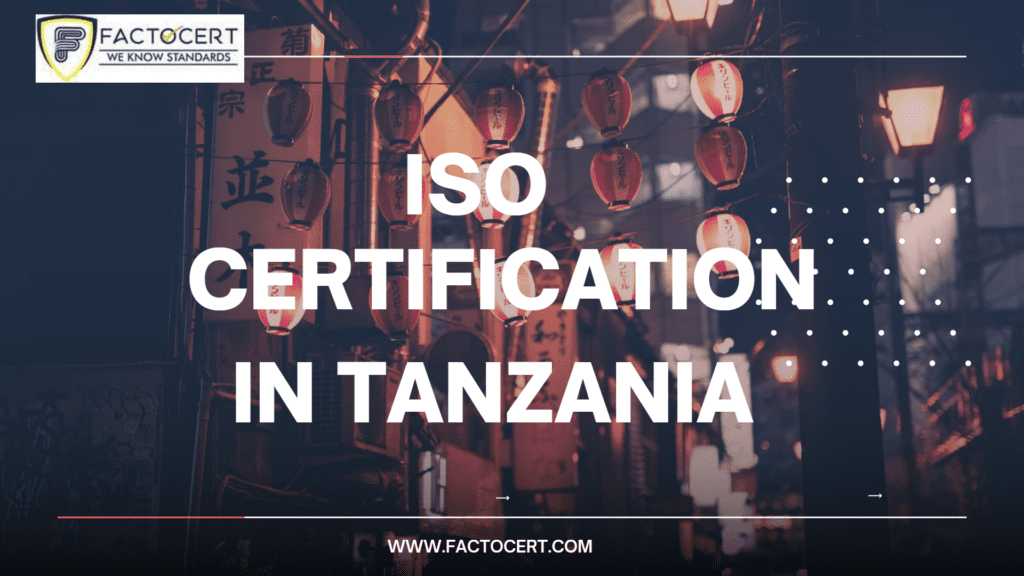ISO Certification in Tanzania, Having achieved ISO certification, a business in Tanzania has shown that it conforms with global norms in several areas, including quality, safety, and environmental management. It demonstrates the firm’s commitment to sustaining these standards, enhancing its reputation, and inspiring trust among Tanzanian market players.
Businesses benefit from occupational health and safety (OHS) ISO certification in Tanzania by creating a safe and healthy working environment. OHSMS (Occupational Health and Safety Management Systems) are the exclusive focus of the global standard ISO 45001.
Following are some ways that ISO Certification in Tanzania could help with occupational health and safety:
- Structured Framework: The ISO 45001 framework may be used to develop, administer, and continuously enhance the OHSMS. This ensures the business follows a systematic strategy for locating, assessing, and managing occupational health and safety risks.
- Compliance with Legislation and Regulations: ISO certification in Tanzania helps companies keep up with Tanzania’s OHS legislation and relevant regulations. This ensures that the company complies with any local health and safety laws that may be in force.
- Risk Management: Risk management and assessment are highly stressed in ISO 45001. Organizations may decrease workplace accidents, injuries, and illnesses by recognizing and mitigating possible risks and dangers. This proactive approach could lead to fewer accidents and the associated costs.
- Employee happiness and productivity are both improved by a safe and healthy work environment. Workers who feel the firm prioritizes them are more likely to be involved, productive, and committed to the organization.
- Reduced Incidents and Costs: Using ISO 45001 protocols may help avoid occupational injuries, illnesses, and accidents. The money spent on insurance, medical expenses, compensation claims, and missed time at work due to accidents may decrease.
- Certification under ISO 45001 demonstrates a company’s commitment to occupational health and safety and enhances its credibility. The firm could have a better positive reputation with clients, partners, investors, and other stakeholders.
- Competitive Advantage: Companies may have a financial advantage if they get ISO certification in Tanzania. Many customers and clients prefer working with businesses that put their stakeholders’ and employees’ safety first.
- Continuous Improvement: The ISO 45001 standard encourages companies to establish an endless improvement cycle. Regular audits and assessments help identify OHSMS improvement areas, leading to ongoing safety protocol advancements.
- Stakeholder Confidence: Stakeholder confidence in an organization’s ability to effectively manage occupational health and safety grows due to ISO certification in Tanzania. Employees, customers, administrators, shareholders, and the general public could be involved.
- Global Acceptance: ISO standards are widely recognized, which is helpful for companies that operate outside of Tanzania or want to increase their international clientele. The standard approach facilitates communication with partners from different geographical locations.
To get ISO 45001 certification, a business typically has to develop and implement an effective OHSMS, conduct internal audits, and submit to external audits by reputable certification bodies. The process comprises a thorough analysis of the company’s health and safety practices to ensure conformity with ISO standards.
How does Factocert significantly advance Tanzania’s ISO Certification?
Factocert is one of the leading Tanzanian providers of ISO certification. We provide the best ISO consultant service in Dar es Salaam, Mwanza, Dodoma, Mbeya, Moshi, Morogoro, and other significant Tanzanian cities, including implementation, training, auditing, and registration services. Numerous ISO Standards are available from us, including ISO 9001, ISO 14001, ISO 13485, ISO 22000, ISO 17025, ISO 45001, and many more.
Factocert is a well-known ISO Consultants in Tanzania that offers businesses invaluable information. Their recommendations facilitate efficient ISO standard adoption, audits, and adherence monitoring, for more assistance visit www.Factocert.com. Factocert’s involvement streamlines the certification procedure for Tanzanian companies, enhancing their operational efficiency, credibility, and international competitiveness.
Conclusion: It’s essential to keep in mind that obtaining ISO certification in Tanzania requires an ongoing commitment to maintaining and enhancing occupational health and safety practices to safeguard employees’ well-being and the effectiveness of the business as a whole.
For more information visit: ISO Certification in Tanzania





